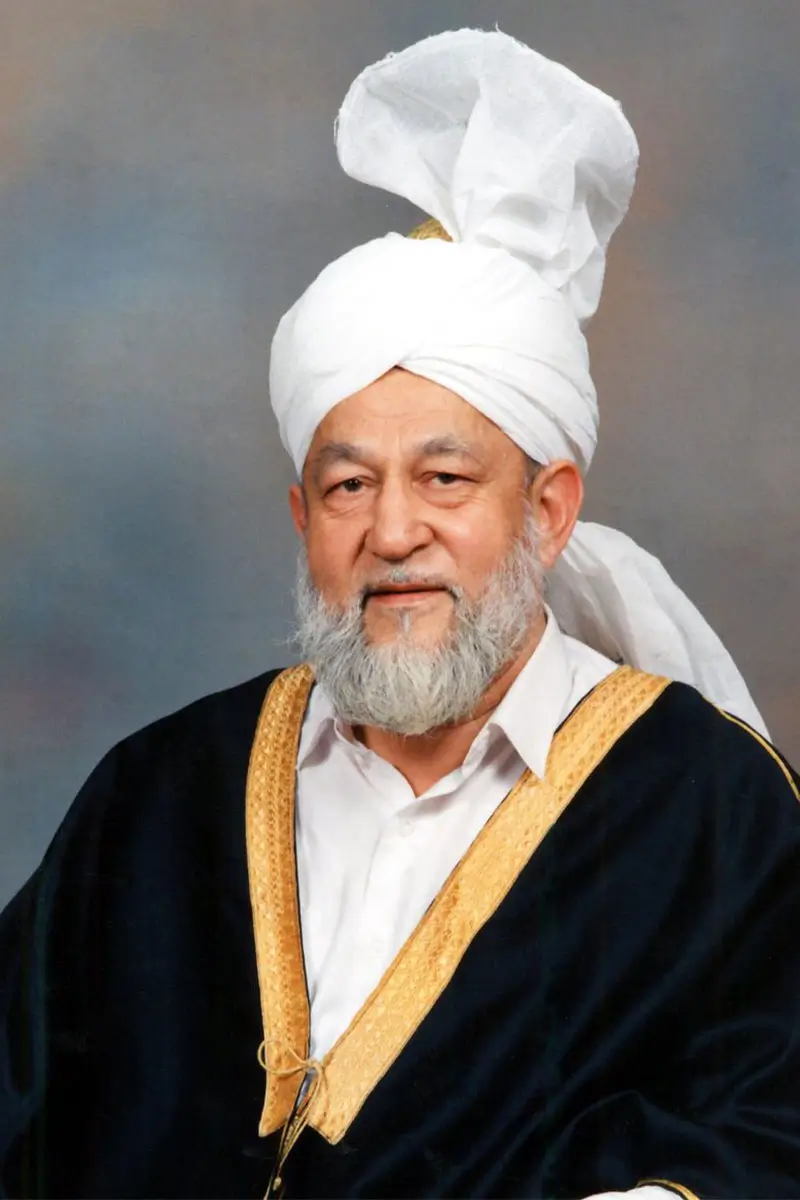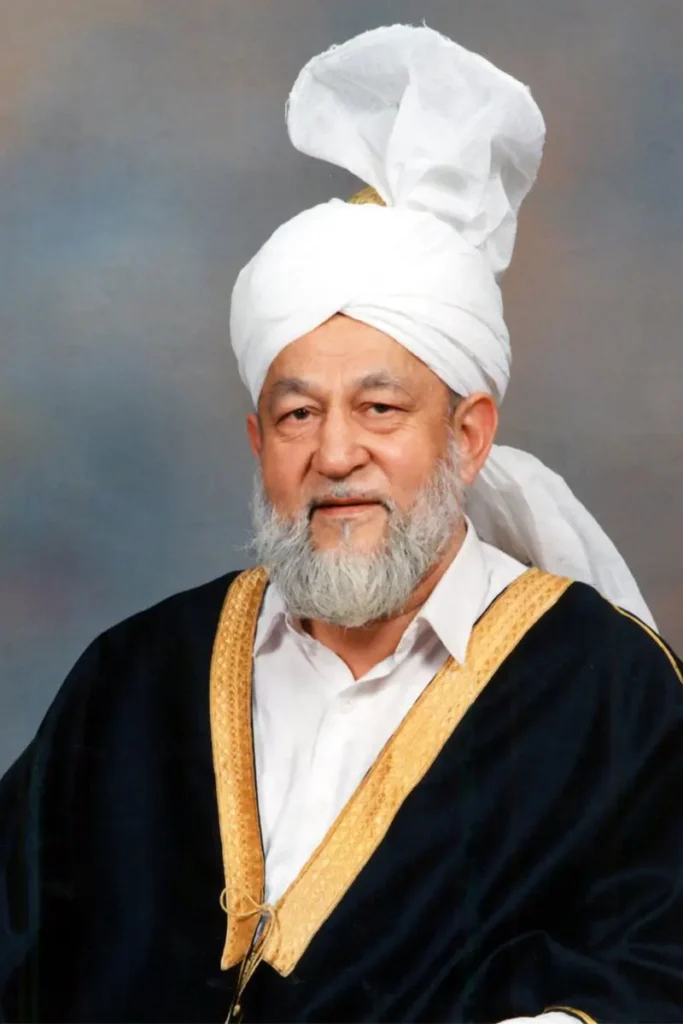Huzoor (rh): What he claimed was, he is the same person whose coming was predicted by An-Huzoor sallallahu alaihi wa sallam and whom An-Huzoor sallallahu alaihi wa sallam himself had addressed as a Prophet. This was his claim. So if that claim is repeated by anyone in future, it would be his duty to prove that An-Huzoor sallallahu alaihi wa sallam has also referred to another one as a Prophet, giving him a title. If he proves it, most welcome. The people of his time would willingly believe in him, Allah would force them to accept him.
Questioner: Particular point (inaudible)
Huzoor (rh): No, no, it doesn’t. It doesn’t at all. Because when you say, مِّنَ النَّبِیّٖنَ, it does not mean plural would come. It’s a way of expression. It’s a language. You should understand first the grammar of Arabic to translate this word. مِّنَ النَّبِیّٖنَ means from among the Prophets and it refers to the previous Prophets because it is they who are mentioned. You must first understand the full text of this verse. Only then your confusion in your mind would be removed.
The claim is, مَنۡ یُّطِعِ اللّٰہَ وَالرَّسُوۡلَ, whoever obeys Allah and the Prophet, Hazrat Muhammad Mustafa sallallahu alaihi wa sallam. Now this whoever is a plural as well as a singular. The number is not mentioned. A possibility is opened. That has to be kept in mind. A possibility is opened that whoever obeys Allah and follows his prophet Muhammad, peace be upon him, sallallahu alaihi wa sallam, would be counted among those who appeared before them. Who would be treated like those, we can also translate it like this. Who appeared before them and who were well rewarded by Allah. Such as مِّنَ النَّبِیّٖنَ or those who were from among the Prophets and among those. So the plural is referred to the Prophets of the past, and the promise says that you could also reach the status which was given to the Prophets of earlier ages. That is the true meaning. The number who would attain that status is not mentioned. If there are more, there would be more of such. If there are less, there would be less of such.
Even those ulama who claim and try to deceive other Muslims by pointing out to the plural Nabiyeen they say if that argument is correct there should be many Prophets (who) believe that there is only one Siddiq in the Ummah. That is Hazrat Abu Bakr Siddiq, and if you say if there is another Siddiq, they would be after you. Why? Because the other Siddiqs those who are Sunnis they don’t believe in Imamat like Shias they claim that there was just one Siddiq. Well this verse (4:70) says Siddiqina that is also plural. So anybody who truly understands the Arabic and the diction of this verse would fully understand that here the style is this that only those would be given, rewarded by Allah who follow Allah and Muhammad Mustafa Sallallahu Alaihi Wasallam and they could be one of those.
Questioner: (inaudible). Accoutable
Huzoor (rh): Such people would be counted among them. Now they are four now together. So the plural they are a plural in themselves four all together under one bracket. It does not mention this verse that how many of such people would rise to what status. Even if one rises to that status to a single status that promise is fulfilled. It doesn’t say that Nabiyeen would come. This is where you are wrong. It says that Nabiyeen are those who were rewarded before them. Siddiqin are those who were rewarded before them. Saliheen are those who were rewarded before them and Shahideen are those who were rewarded before them. The whole verse which follows is an explanation of who were those who were rewarded before them.
Questioner: (Inaudible)…if there will be…(inaudible)…Thank you.
Huzoor (rh): Yes, the point is, the style is this that when it is said they could they would also be rewarded then the verse begins to explain who were those who were rewarded, and the plural tenses are referring to the past people, and they were of course Nabiyeen and Siddiqin and Shahideen and Salaha they were all in the plural. So this was referred to them. So anybody who follows could be one of those. This is the meaning of the verse, and the number of how many would follow that is not mentioned. But apart from that I believe that when Allah says that (Arabic)
They are also covered with this verse. They are among those who are like Nabiyeen before them. This is exactly what is said. So the question of plural does not arise in any way. I mean they are in plural in fact. Hazrat Masih Maud A.S. is one of the subordinate Prophets. That is what we can say and the number of subordinate Prophets is much larger than you can conceive. Because there are two types of subordinate Prophets. One whom Hazrat Sallallahu Alaihi Wasallam gave the title himself. By saying he would be Nabi and in between him and myself there would be no one with the title of Nabuwat. That is whatHuzoor-e-Akram Sallallahu Alaihi Wasallam has said in so many words. Yet he says that there will be so many of my ulama who would be like the Prophets of the old and this verse is also referring to the Prophets of the old. مَنۡ یُّطِعِ اللّٰہَ وَالرَّسُوۡلَ فَاُولٰٓئِکَ مَعَ الَّذِیۡنَ اَنۡعَمَ اللّٰہُ عَلَیۡہِمۡ People of the past on which Allah appeared with grace and mercy and rewarded them. So they would be counted among those and this is what he is saying. That ulama ummati would be like the Prophets of the old. So there are so many. This is what I have been trying to explain to him. That don’t underestimate the status of even those who are not entitled Prophets in ummah. Because according to An-Huzoor Sallallahu Alaihi Wasallam and according to this promise of Mayyuta illaha they are no less than Prophets. By the standards which we observed before the era of An-Huzoor Sallallahu Alaihi Wasallam they are definitely not less than Prophets. By the standard which was observed by us after the era of An-Huzoor Sallallahu Alaihi Wasallam or at the appearance of An-Huzoor Sallallahu Alaihi Wasallam they can’t be called Prophets because that standard has risen now. Because this verse only promises prophethood according to the past standards referring to those. So it is true. There are so many.








